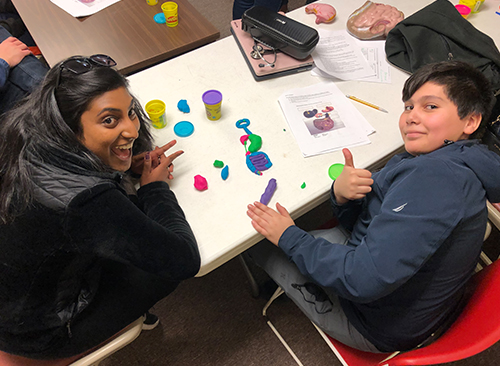
A group of Oakland University William Beaumont School of Medicine medical students behind a successful mentoring program for local Latinx youth hopes to help medical schools nationwide establish similar programs.
Five current and former OUWB students — along with Claudio Cortes, Ph.D., assistant professor of immunology, OUWB Department of Foundational Medical Studies — have published a paper on the OUWB-Hispanic Newcomer Outreach (HNO) Mentoring Program.
“Medical Students as Mentors of Latinx Youth: A Model for Increasing Cultural Competence and Community Engagement in Medical Schools,” recently appeared in the Journal of Higher Education Outreach and Engagement.
The paper describes the establishment and success of the OUWB-HNO Mentoring Program that launched in 2016, and has since involved a total of 135 medical students working with 127 mentees over the course of about 4,500 hours.
Lead author is fourth-year OUWB medical student Mallory Peters. Co-authors are OUWB Class of 2020 members Belinda Asare, M.D., and Connor Whitaker, M.D., along with current students Ryan Rogers, M3, Helen Huetteman, M3, and Cheyenna Espinoza, M4.
“I really love and believe in our program and I think it would be awesome if something like it could exist everywhere,” said Peters.
Building a program
The OUWB-Hispanic Newcomer Outreach Mentoring Program is a collaborative effort between OUWB and Catholic Charities of Southeast Michigan (CCSM).
The OUWB-HNO Mentoring Program began as a supplement to an existing mentorship program at the Pontiac-based nonprofit.
Cortes helped create the program and serves as faculty coordinator. In addition to CCSM, co-sponsors of the program are Compass (the official address of OUWB's community engagement), and the Latino Medical Student Association.
Cortes said Catholic Charities originally reached out to OUWB because the organization needed mentors. They also sought to incorporate more educational elements into the mentorship programs.
In short, medical student volunteers are paired with a local Latinx youth between the ages 8 and 15 to provide guidance and serve as a positive role model. About 30 OUWB medical students participate annually.
“A lot of my motivation is to give back and give these kids something that I didn’t have when I was growing up,” said Espinoza. “I want to show them they are capable…whether they want to go into medicine or something else.”
Mentors and mentees commit to attending sessions about twice a month, as well as participate in weekly phone-calls.
Each in-person session revolves around one topic that may be educational or extracurricular. One session might involve anatomy or the health benefits of dancing, while another could be a field trip to a cider mill in autumn (the program has been entirely based online during the COVID-19 pandemic).
Upon completion of the program, mentees present on a project that he/she completed under the guidance and direction of their mentor, whereas medical students receive a formal certificate of community service.
‘A good jumping off point’
Peters said there is a relatively simple reason for wanting to publish a paper on the program.
“We want other (medical school) programs around the United States to see this paper, look at what we did, and then see how it fits into their programs,” she said.
Cortes said the paper essentially is an in-depth look at how other medical schools might create such programs and generate successful partnerships that benefit medical students and their potential community partners.
It describes the beneficial aspects of the program for participating medical students who serve as the mentors, as well as the positive impact on the Latinx (the mentees).
“The (Latinx) kids are communicating better with their parents, getting better grades, showing increased interest in studying,” said Cortes. “Eventually, the mentor role evolves because they become more of a role model…many of the kids now say they want to be a doctor.”
The authors said they believe there are many places across the U.S. that could benefit from such a program. They note the key — as explained thoroughly in the recently published paper — is working with representatives of respective local communities to ensure a good fit for how the program is developed.
“We offer a good jumping off point,” said Peters. “People would likely want to try something similar and measure the outcomes to see if it’s working for them or not. It’s an approach that reemphasizes the importance of really being a partner in the community rather than just trying to deliver something.”
For more information, contact Andrew Dietderich, marketing writer, OUWB, at [email protected].
To request an interview, visit the OUWB Communications & Marketing webpage.
NOTICE: Except where otherwise noted, all articles are published under a Creative Commons Attribution 3.0 license. You are free to copy, distribute, adapt, transmit, or make commercial use of this work as long as you attribute Oakland University William Beaumont School of Medicine as the original creator and include a link to this article.

